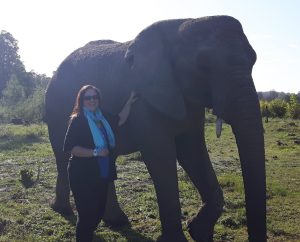Contact Go Global
Location: University Centre 227
(Global Engagement Office)
Email: goglobal.okanagan@ubc.ca
Hours of Operation:
Monday to Friday, 8:30am to 4:30pm
For immigration-related inquiries, please contact International Student Advising
Meet With Us:
To meet with us between April 25 and August 30, 2025, please e-mail our office to set an appointment. Our advisors are available by Zoom or in-person, dependent upon advisor availability.
Drop-in availability will resume in September, 2025.
Meet the team
 I am in my 16th year with Go Global and have loved watching it grow over the past decade. I am a BA graduate from UBC Okanagan and an MEd graduate from UBC Vancouver and spent part of that degree in Copenhagen. I’ve recently completed my PhD with a focus in overseas short-term programs. I have a serious love of traveling, reading, and lifelong learning.
I am in my 16th year with Go Global and have loved watching it grow over the past decade. I am a BA graduate from UBC Okanagan and an MEd graduate from UBC Vancouver and spent part of that degree in Copenhagen. I’ve recently completed my PhD with a focus in overseas short-term programs. I have a serious love of traveling, reading, and lifelong learning.
I have learned an incredible amount while abroad and I’ve taken quite a few solo adventures. I highly recommend traveling alone at least once as it squashes fears and will boost your confidence to continue exploring. I fully believe that studying overseas is what you make it, so go abroad with an open mind and say yes to experiences no matter how scary they might sound at first. Introduce yourself to new people and don’t hide in your dorm room!
 As a frequent traveller and dual-citizen of Canada and the United Kingdom, I am well aware of some of the unique challenges and obstacles that students may encounter both when considering whether to go and while on exchange. Having completed two degrees at UBC Okanagan (BA and BEd), I know how easy it is to find reasons not to go on exchange and am passionate about encouraging students to take advantage of the opportunity to go on exchange while they can (speaking from experience of someone who did not take the opportunity to go abroad and regrets it on regular occasion).
As a frequent traveller and dual-citizen of Canada and the United Kingdom, I am well aware of some of the unique challenges and obstacles that students may encounter both when considering whether to go and while on exchange. Having completed two degrees at UBC Okanagan (BA and BEd), I know how easy it is to find reasons not to go on exchange and am passionate about encouraging students to take advantage of the opportunity to go on exchange while they can (speaking from experience of someone who did not take the opportunity to go abroad and regrets it on regular occasion).
My goal as your Go Global Advisor is to help you have the best exchange experience possible while ensuring you meet all requirements for graduation. No matter where you decide to Go Global, it is a life-changing decision that you will never regret in life!
I recently completed my Masters of Business Administration, and when I’m not head deep in work or study, my passions include travel, playing & watching football (soccer), supporting Liverpool FC, and continued learning/development.
 I have a great passion for studying cultures, completing an Honours in Anthropology focusing on the connection between nationalism, social stratification, and cooking customs of Soviet women in my Honours Thesis. As a first-generation immigrant in Canada, I always seeks an opportunity to make the process of cultural adaptation more pleasant for others and contribute to the minimization of discrimination, cultural bias, and racism in Canadian society. I was also a long-term volunteer with CILLDI (Canadian Indigenous Languages and Literacy Development Institute) and see the Truth and Reconciliation Commission as guiding my work. I gained most of my mentorship and coaching experience working as a youth educator for immigrant children in Israel and as a writing and learning tutor at Grant MacEwan University.
I have a great passion for studying cultures, completing an Honours in Anthropology focusing on the connection between nationalism, social stratification, and cooking customs of Soviet women in my Honours Thesis. As a first-generation immigrant in Canada, I always seeks an opportunity to make the process of cultural adaptation more pleasant for others and contribute to the minimization of discrimination, cultural bias, and racism in Canadian society. I was also a long-term volunteer with CILLDI (Canadian Indigenous Languages and Literacy Development Institute) and see the Truth and Reconciliation Commission as guiding my work. I gained most of my mentorship and coaching experience working as a youth educator for immigrant children in Israel and as a writing and learning tutor at Grant MacEwan University.

During my undergraduate at UBCO I studied in Denmark at the University of Copenhagen. (Here is me at Nyhavn, a famous street there!)
My Go Global experience impacted me far greater than I expected. It opened up a world of opportunities for me through learning about different cultures in a deep and unique way and gave me meaningful connections, friendships, and memories.
I have just graduated with my BA, having majored in International Relations. As the Go Global Associate Advisor I want to help connect students to this great opportunity that UBCO has. Having first-hand experience in the difficulties and stress of getting ready to study abroad, I am excited to help other students with their application process and get them excited for what is to come.
Go Global Ambassadors
If you would like to get in touch with one of our ambassadors please e-mail goglobal.okanagan@ubc.ca to let us know!
Also, check out our Ambassador’s Desk video series to hear what our returned students have said about their experience of going abroad!
Format for below: Name, location of exchange, area of study

I studied abroad with Go Global from February to November 2023 on a split-year exchange at the University of Queensland (UQ) in Brisbane, Australia. During the 10 months I spent living Down Under, I gained a sense of confidence and independence that I never expected, made some truly incredible memories, endeavoured on plenty of adventures, and met lifelong friends from all around the globe. This picture was taken by my now partner (who is Australian himself!) on a camping trip we took to Australia’s Northern Territory to see and hike around the massive rock formations of Uluru and Kata Tjuta between semesters – one of the many trips we took to see as much of the country as we could.
While at UQ, I marveled at the stunning sandstone buildings of the St. Lucia campus, enjoyed peaceful walks and runs along the Brisbane River, and even tried residence life for the first time. I also had the opportunity to take courses that I could put toward my major in microbiology, my minor in psychology and other interesting electives that aren’t available at UBCO such as Agriculture & Gene Technology and Climate Change Biology.
With my exchange behind me and my last semester at UBCO ahead, I am super excited to be Go Global Ambassador so that I can help address the questions or concerns of anyone still considering the program and support students as they prepare for their upcoming time abroad. I encourage everyone to take advantage of the amazing experiences that Go Global offers. For many of us, graduate programs and future plans will make travel tricky so why not fit it in now?

This past year, I completed the third year of my English undergrad at the stunning University of Edinburgh in Scotland. I spent the year immersing myself in some incredible academic opportunities, travelling across the UK and Europe, and making friendships and memories I’ll hold onto for many years to come. I lived in one of the most beautiful cities in the UK, albeit one of the wettest ones, and found myself surrounded by incredible history everywhere I went—so much history that it took me three months to realize I was walking past Sir Walter Scott’s childhood home every morning on the way to class!
From discovering the novel I’m now writing my thesis on to booking last-minute 6am flights to brand new cities, Go Global offered me once-in-a-lifetime chances to step out of my comfort zone and learn new things about myself and the world around me. It also taught me to always, always bring a raincoat (iykyk) and never underestimate the power of a Tesco meal deal. I’m thrilled to be coming back to UBCO as an ambassador to share some of my memories and experiences with you! I tell people about my exchange constantly whether they want to hear it or not, so I’m very excited to get to know people who are just as excited as I am. Never hesitate to reach out with any questions or ideas you may have—I would love to hear from you!
This photo was taken outside a 7th century castle in St. Andrews, a famous university town about an hour and a half away from Edinburgh. It was so pretty it was worth almost getting blown off a cliff!

In the second semester of my 3rd year, I had the opportunity to study abroad with Go Global at the National University of Singapore. During this term, I had the privilege to make long lasting connections with people all over the world while also immersing myself into the Singaporean culture. I also had the chance to travel all around South East Asia (Vietnam, Thailand, Indonesia, and Malaysia), enriching my understanding of unfamiliar cultures, religions, and Asian values. The picture on your left was taken during Chinese New Year at the Buddha Tooth Relic Temple where I got the chance to finally celebrate CNY in an Asian country!
From trying new dishes at Hawker centers to catching a Scoot flight at 2 am, Go Global offered me opportunities to learn more about myself including appreciating my Asian heritage to refining my career goals. Most importantly, this experience taught me to remain positive even during heat waves (yes it’s as hot as everyone says) and to always be open to new experiences even if you’re scared.
I’m so excited to share more about my experience at NUS as a Go Global Ambassador because it truly was the BEST decision I have made so far. I got the chance to take novice classes as well as pick up new hobbies including Pickleball and Mahjong. Any chance to reminisce about Chicken Rice or the $95 roundtrip flights to Vietnam is a chance for me to show people how amazing Go Global is, so I hope I inspire others to be as excited as I was back in January. If you have any questions at all such as traveling tips or culture shocks, feel free to reach out!

Earlier this year I completed the second semester of my third year abroad at the University of Adelaide in Adelaide Australia. I was originally supposed to do the full split-year February to November 2024. Unfortunately there was an unexpected hiccup where I needed to end my exchange early. Despite the unfortunate turn in events i had an amazing time abroad and I cannot wait to return to Australia to pursue my graduate studies. During my exchange learned so much about myself. I had to become 100% self reliant and independent. Being on exchange I meet so many people from all around the world. Even some local Aussies who are moved to Vancouver in June.
Being on exchange myself, I met lots of people who were also on exchange and it was really easy to make friends. Funny enough I met lots of Canadians down under. The friends I made on exchange really made my experience 10 times better. We travelled all over Australia (Sydney, Melbourne, Brisbane, Gold Coast and Cairns) together and did tons of outdoor activities such as camping and hiking to name a few. We immersed ourselves in the laid back surfing culture and was barefoot way too often. I would have never asked for a better more outgoing group of people. I also met my girlfriend in Australia, who was also on exchange from Toronto coming from the University of Toronto. On the way back to Canada we stopped in New Zealand for a month and hired a camper van, and drove across New Zealand. Covering 4650 km in 25 days. I think everyone should travel there. This experience infected me with the travel bug and I’m itching to return to the airport.
I am excited to be a Go Global Ambassador and share my experience. I truly believe everyone should go on exchange it was the best decision I made during my degree. I love answering questions regarding my degree, please reach out if you have questions about the program or if you just wanna chat about travel. I can’t wait to meet and hear from you guys!
The photo above is from the trip we took to the Gold Coast and we rented a boat and sailed thought the canals for dinner and sunset.

I was on exchange for term 2 (January – June) in Oslo, Norway studying at the University of Oslo. The main reasons I chose to study in Oslo were that the school is well known for its geography and sustainability programs, as well as an interest in learning about Scandinavian and Norwegian culture. I met so many different international students that turned into travel buddies.
Being in central Europe allowed me to travel to Sweden, Italy, Austria, Czech, Germany, Netherlands, England, and Ireland. Traveling taught me to appreciate different cultures, museums, food and people.
This picture is me ice swimming in central Oslo. Saunas and ice baths are a big thing in Norway and Scandinavia. One main way to connect with local people is by engaging in local practices and hobbies like knitting and sports. I joined the knitting and drinking club as well as the rowing club, which helped me meet locals.

For the third year of my BSc. Biology, I spent the full year (Aug’23 – May’24) studying at Université Grenoble des Alpes in France! Right in the heart of the French Alpes, it was incredibly easy to hop on a (cheap) train or bus and be in an entirely new city or country in a matter of hours. This was my way of scratching the “European backpacking” itch while still earning university credit. I’m bilingual, so I chose to take classes in both French and in English. The French system also requires a sport elective to graduate, so I got the opportunity to be graded on my, newly acquired, water polo skills.
It was insanely cool to quite literally navigate foreign territory, both in the travelling sense and in the practical sense. I felt empowered on my first solo trip, being able to use the public transit system to get from my hostel to the train station on my own in Italy. Then also, throughout the navigation of the school system and setting up a new bank account. My Mom came to visit me (which definitely helped with homesickness) and we got to see our first live football game in Monaco. I can’t speak about my life abroad without mentioning the people. The French do have a… stubborn reputation, but all the student I met were so sweet and had so many questions about Canada. I feel like I know my own culture better now because I couldn’t take it for granted. Plus, so many of my friends were also on exchange from countries all around Europe and around the world. In retrospect, it was an intercultural exchange rather than just a cultural one.
I have so many fond memories from walking the canals of Venice, Christmas Markets in Strasbourg, swimming in the Mediterranean Sea, skiing in the Alpes, my newfound unironic love of cured meats, cheeses, and wine… The memory that I’ve decided to share is the pictured moment when my friends and I went to Amsterdam for reading break, and the whole trip was muggy and wet, until we went to the tulip garden and spent the whole day wandering around with blue skies above. Please, please, please come ask me about any and all aspects of exchange and/or travel. I could not recommend it more, and I swear it’s more feasible than you think 😉